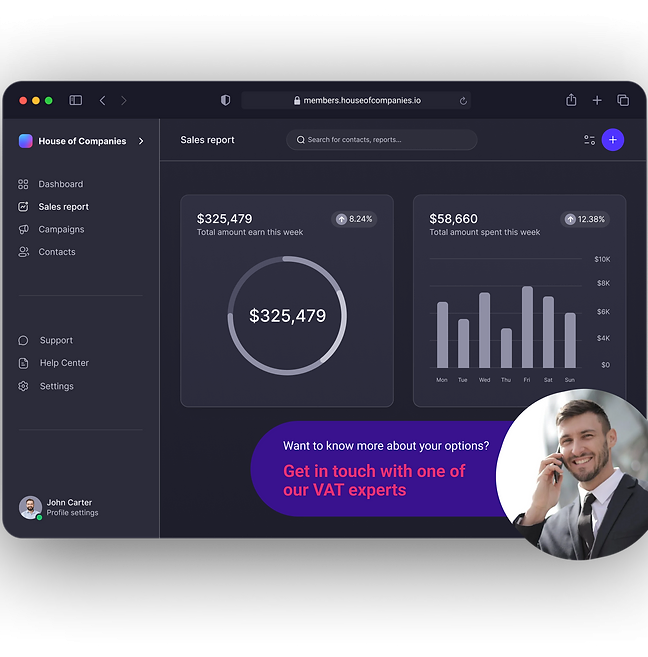Preparing your annual financial statements in France can be a complex and intricate process, but with the right guidance and tools, it becomes much more manageable. House of Companies is here to support both resident and non-resident businesses in ensuring compliance with French regulations.
Our expertise and resources are designed to help you navigate the requirements effectively, allowing you to focus on your core business activities while we handle the financial intricacies.

We automate the preparation of financial statements in France, making the process efficient and accurate. Our advanced systems are designed to minimize manual input, which not only saves time but also reduces the likelihood of errors that can occur during data entry. By leveraging technology, we ensure that your financial statements are prepared in a timely manner, allowing you to meet all necessary deadlines without stress.




This means that you can have a dedicated professional manage all your financial needs, from data collection to the preparation of your financial statements. This service is particularly beneficial for businesses that may not have the internal resources or expertise to handle these tasks effectively.
With a French bookkeeper, you can rest assured that your financial matters are in capable hands.




Even without an accountant, you can prepare accurate financial statements by following our comprehensive guide. This guide provides step-by-step instructions and practical tips to help you navigate the process independently. It covers everything from data collection to final reporting, ensuring that you have all the information you need to succeed.
Use our recommended data collection methods and tools to gather all necessary financial information. This may include using accounting software, spreadsheets, or other digital tools that can help you organize your data efficiently. The key is to ensure that all financial transactions are recorded accurately and in a timely manner. This foundational step is critical for the integrity of your financial statements.
French LLCs must prepare a comprehensive set of financial documents, including the balance sheet, income statement, and notes that explain these documents. Small entities may not require an audit, but the statements must still provide a clear picture of the company's financial position.
Collecting financial data can be significantly enhanced by utilizing advanced tools and software that automate and streamline the process. For example, platforms that offer real-time ledger generation and tracking help maintain up-to-date financial information, promoting transparency and reducing the risk of misstatements. Furthermore, tools that support the scanning and organized storage of documents facilitate the efficient extraction and processing of data, ensuring that all financial information is accurately captured and readily available for reporting.
In the preparation of financial statements for a French LLC must comply with specific standards to ensure transparency and compliance. These standards dictate the inclusion of the balance sheet, income statement, and, depending on the company's size, the cash flow statement.
The balance sheet is a fundamental component of financial statements, providing a snapshot of the company's financial position at a given time. It includes assets, liabilities, and shareholders' equity, formatted according to the French accounting standards set out in the Plan Comptable Général. The balance sheet must balance the equation where total assets equal the sum of liabilities and shareholders' equity.
The income statement, or profit and loss account, details the company's financial performance over the fiscal year. It includes both realized and unrealized profits and losses, reflecting income from investments and operational activities. This statement also features distinct categories for taxes and exceptional items, which are specific to the French context. It provides insights into the company's revenue streams and operational efficiency.
For medium-sized and large companies, a cash flow statement is required and is considered a primary financial statement alongside the balance sheet and income statement. This statement categorizes cash flows into operating, investing, and financing activities, offering a detailed view of the company's liquidity and financial flexibility.
Leveraging modern technology, the House of Companies portal facilitates the real-time generation and tracking of financial statements. This platform integrates seamlessly with existing financial systems, allowing French LLCs to maintain accurate and up-to-date records. The portal supports the automation of balance sheet and profit and loss account creation, ensuring compliance with French GAAP and reducing the risk of misstatements. This tool is invaluable for French LLCs looking to streamline their financial reporting processes and ensure accuracy in their financial disclosures.
By adhering to these standards and utilizing advanced tools like the House of Companies portal, French LLCs can effectively prepare their financial statements, ensuring they meet regulatory requirements and provide valuable insights into their financial health.
Compliance with French Generally Accepted Accounting Principles (GAAP) is critical for French LLCs to maintain transparency and legal integrity in financial reporting. French GAAP, influenced by EU directives, sets a framework that mandates financial information to be understandable, relevant, reliable, and comparable.
Under French law, financial statements must accurately reflect the company's financial position, presenting equity at the balance sheet date and profit for the year fairly and consistently. This includes a comprehensive balance sheet, income statement, and explanatory notes. Specific valuation and disclosure requirements must be adhered to, ensuring all financial reports provide insight into the company’s solvability and liquidity.
Failure to comply with French GAAP can lead to significant consequences for French LLCs. Non-compliance may result in the rejection of financial statements by auditors, legal penalties, or discrepancies reported to authorities. This can affect the company’s reputation and its ability to secure future financing or partnerships.
Directors bear significant responsibility under French corporate law. They must ensure that all financial reporting complies with French GAAP. If directors fail in their duty of care, they may be held personally liable for any resultant damages to the company. This includes scenarios where poor financial governance leads to bankruptcy or legal issues. Directors must act with due care and attention to avoid personal liability.
By strictly adhering to French GAAP, directors safeguard themselves from potential liabilities and uphold the financial integrity of their French LLC.
In the complex financial landscape of France, the role of a chartered accountant, particularly in external auditing, becomes indispensable for French LLCs. These professionals, governed by stringent regulations and possessing specialized training, ensure that financial statements not only adhere to French GAAP but also present a true and fair view of the company’s financial health.
External auditing, conducted by certified accountants, is crucial for verifying the accuracy of financial statements against the International Financial Reporting Standards. Such audits provide an independent assessment, ensuring that the financial representations made by a company are both accurate and compliant with required standards. This process is not only beneficial but often necessary to maintain transparency, enhance credibility, and uphold the integrity of financial reporting.
For French LLCs, the input of a chartered accountant can be particularly valuable in scenarios where unbiased, expert verification of financial records is required. Engaging with external auditors can lead to the discovery of discrepancies or potential areas of fraud, providing management with critical insights into risks and overall financial health. The feedback and strategic advice offered by these auditors can drive improvements in financial practices and controls, directly influencing operational efficiency and profitability.
To ensure regulatory compliance and transparency, French LLCs must file their annual financial statements with the Greffe du Tribunal de Commerce in a timely manner. This process is crucial for maintaining the legal and financial integrity of the business.
The board of directors is responsible for preparing the annual accounts within six months after the financial year ends. These accounts are then presented to shareholders, who have two months to adopt them. Following adoption, the financial statements must be filed with the Greffe within a month.
If the financial year aligns with the calendar year, the latest filing date without extension is 30 June. However, extensions may be granted in certain circumstances.
To ensure compliance and accuracy in financial reporting, French LLCs must diligently prepare and submit their corporate tax returns. This process involves a series of critical steps designed to accurately reflect the company's financial activities over the fiscal year.
Corporate taxpayers in France are obligated to file their tax returns annually, with a general deadline set at five months following the end of the financial year. However, extensions can be requested if more time is needed to prepare accurate filings.
The calculation of CIT is based on the company's taxable profits, including adjustments such as loss carryforwards. The French tax authorities may issue provisional assessments, which are adjusted after the final tax return is submitted.
French LLCs may be audited by tax inspectors to ensure all financial activities and tax filings adhere to regulations. This scrutiny promotes transparency and compliance.
Corporate tax returns must be filed digitally. Companies can manage this process in-house using approved software or outsource it to a tax service provider. For those needing more time, filing extensions can be applied for through the French Tax Administration’s website.
For foreign taxpayers earning income in France, understanding the implications of international tax treaties is crucial to prevent double taxation on the same income.
By following these guidelines and utilizing available resources, French LLCs can effectively manage their corporate tax obligations, ensuring compliance and contributing to their overall financial health
How can one access the financial statements of companies in France?
You can obtain the financial statements of French companies by ordering them online through the Greffe du Tribunal de Commerce, for which a fee is charged.
What type of accounting system is prevalent in France?
France employs a double-entry bookkeeping system for accounting, mandating that every financial transaction is recorded with both a debit and a credit entry.
Are the financial statements of companies publicly available in France?
Yes, companies in France are required to prepare annual financial statements and file them with the Greffe, making them publicly available.
Which accounting standards do French companies adhere to?
French companies must comply with French GAAP, and those listed on a regulated market also follow the International Financial Reporting Standards (IFRS).
[1] - https://www.houseofcompanies.io/
[2] - https://www2.deloitte.com/content/dam/Deloitte/nl/Documents/audit/deloitte-nl-audit-annual-accounts-in-the-netherlands-2019.pdf
[3] - https://theaccountingjournal.com/netherlands/financial-reporting-in-the-netherlands/
[4] - https://online.hbs.edu/blog/post/how-to-prepare-an-income-statement
[5] - https://www.youtube.com/watch?v=aRL1MDYFMZ4
[6] - https://www.tax-consultants-international.com/publications/accounting-and-audit-requirements-in-the-netherlands
[7] - https://www.bnnlegal.nl/en/services/insolvency-law-and-bankruptcy/directors-liability-in-the-netherlands/
[8] - https://www.linkedin.com/pulse/7-reasons-conduct-external-audit-uae-atif-iftikhar
[9] - https://www.nba.nl/opleiding/foreign-auditors/ra-qualifications/the-dutch-educational-system-for-register-accountants/
[10] - https://www.kvk.nl/en/filing/when-do-i-have-to-file-my-annual-accounts/
[11] - https://www.kvk.nl/en/filing/am-i-required-to-file-annual-reports-and-accounts/
[12] - https://taxsummaries.pwc.com/netherlands/corporate/tax-administration
[13] - https://business.gov.nl/regulation/corporate-income-tax/
[14] - https://business.gov.nl/finance-and-taxes/business-taxes/filing-tax-returns/filing-your-corporate-tax-return-vpb-in-the-netherlands/
Utilize the House of Companies Portal to manage your annual financial statements efficiently. Our integrated tools help streamline financial reporting, allowing your business to focus on growth while ensuring compliance and accuracy.
"House of Companies made expanding into France seamless. Their expertise saved us time and resources in navigating French accounting regulations."
 Tech Startup Founder
Tech Startup Founder"As a non-resident business owner, I was worried about compliance. House of Companies' platform made managing our French financials straightforward and stress-free."
 E-commerce Business Owner
E-commerce Business Owner"The real-time reporting feature has been a game-changer for our decision-making process. We're always on top of our financial position in France."
 Multinational Corporation
Multinational CorporationFeel welcome, and try out our solutions and community,
to bring your business a step closer
to international expansion.

Got questions?
Lets talk about your options
Stay updated with the latest news and exclusive offers. Subscribe to our newsletter for regular insights delivered to your inbox!